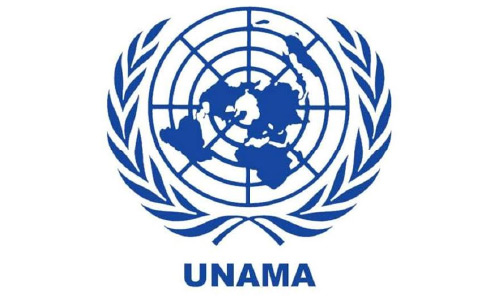KABUL - Marking International Human Rights Day, the UN Assistance Mission in Afghanistan (UNAMA) joined the global campaign ‘Youth Stand Up for Human Rights’ to highlight the role of young people as constructive agents of change, to amplify their voices and to engage a broad range of audiences in the promotion and protection of human rights.
The United Nations campaign is designed to encourage and galvanise youth, and to showcase how young people all over the world are standing up for human rights, including against racism, hate speech, injustice, discrimination, war, as well as a degraded and polluted environment.
“Young people have always been drivers of political, economic and social change, and in Afghanistan the young generation is crucial for shaping the future of the country,” said Tadamichi Yamamoto, the UN Secretary General’s Special Representative for Afghanistan and head of UNAMA. “But for their full potential to be reached, protecting their rights is essential.”
Afghanistan has a very youthful population, with almost two-thirds estimated to be under the age of 25. In 2019, the United Nations marked the 30th anniversary of the UN Convention on the Rights of the Child, a milestone treaty ratified in 1994 by Afghanistan. Notwithstanding significant progress made especially in relation to access to health services and education for girls and boys, including the enactment of the Child Act in March 2019, millions of children in Afghanistan are deprived of their basic rights – including their right to life, to health, to learn, to play, to participate and to develop to reach their full potential. Children continue to be negatively affected by attacks on schools and hospitals, disproportionately harmed by explosive remnants of war, and subjected to recruitment and use by parties to the conflict, as well as sexual violence.
The United Nations continues to work with Afghanistan’s institutions, including the Afghanistan Independent Human Rights Commission (AIHRC), in supporting the implementation of the country’s international human rights obligations, its constitutional framework as well as relevant domestic laws, such as the new Penal Code that criminalises harmful practices such as bacha bazi.
“Listening to victims of human rights violations should be a top priority for the authorities of Afghanistan, and especially so when the victims are children, as lack of accountability fosters a climate of impunity where human rights abusers thrive,” said Fiona Frazer, UNAMA’s Human Rights Chief and the Country Representative of the UN High Commissioner for Human Rights. “The protection of children, women and other vulnerable groups must be at the core of any national human rights protection strategy.”
Under its Security Council mandate, UNAMA will continue engaging on issues related to the protection of civilians, monitoring and reporting on the six grave violations against children, the promotion of human rights and the monitoring of places of detention, including those places where children have been brought for alleged involvement in armed groups. UNAMA has found that such children, in comparison to adults, remain at a higher risk of being subjected to torture and ill-treatment, and calls for their treatment to be with the interest of the child at the fore, leading to their rehabilitation and reintegration.
Human Rights Day is a distinct opportunity to commend all those individuals, civil society organizations and groups actively engaged in promoting human rights for all, often at the risk of their own security. Human rights defenders play an essential role in democratic societies. States are obliged to protect their dignity, liberty and security, along with their physical and psychological integrity. (PR)
Home » Afghanistan » Youth Crucial to Ensuring Respect for Human Rights of All Afghans – UN
Youth Crucial to Ensuring Respect for Human Rights of All Afghans – UN

